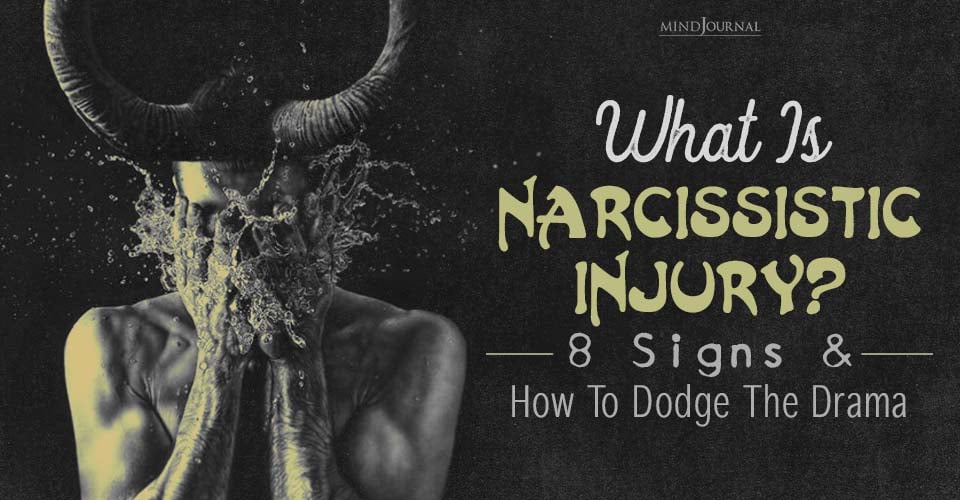Narcissists are not fearless as they appear to be! What do you think narcissists fear the most? Self-respect or criticism or abandonment?
If you know someone who behaves like a toxic narcissist, you have probably recognized that their seemingly unflappable personality is pretty difficult to deal with.
But did you know that there are a number of things that the average narcissist is seriously afraid of – and that they hide these fears in order to avoid having them used against them? It’s true, and that’s exactly what we’re talking about today – the narcissist’s biggest secret fears and exactly why they feel that way.
Your average toxic narcissist might seem pretty fearless, but the truth is that they have a number of secret, hidden fears they don’t want you to know about. Most narcissists want to appear invincible and untouchable.
Related: Can A Person With Narcissistic Personality Disorder (NPD) Have A Good Marriage?
The exception is covert narcissists who purposely appear vulnerable as that is their standard operating mode – but even they have a few fears that they hide from you. The reality is that all toxic narcissists have some deep and dark fears – and you might be surprised to learn exactly what causes their hearts to race.
Related video:
What are the narcissist’s biggest fears?
1. The Narcissist Fears Their Imperfections Being Exposed
You might be totally okay with others knowing about your vulnerabilities and imperfections. That is because you know you are human and you know you are not perfect. And perhaps you can help someone else that is dealing with the same issues and having the same type of insecurities that you are suffering from. The way to do that is by sharing that part of yourself with them. However, the narcissist will do anything they can to hide their imperfections.
They know deep down that they are far from perfect (not that anyone is perfect), and that is why they fear that their imperfections can be exposed somehow. Once that happens, their perfect image will be tarnished for good which is something they want to avoid at all costs.
2. The Narcissist Fears Embarrassment/Public Humiliation
No one wants to be embarrassed or humiliated in public. But for the narcissist, this is the worst possible thing that can happen to them – even though this is often one of the ways the narcissist will use to manipulate and control you.
In fact, if they are worried that someone will humiliate or embarrass them in public, one way the narcissist tries to prevent this is to go out of their way to embarrass others instead. And if they feel at the least embarrassed then they will embarrass you even more – whether or not you’re the one who actually caused the humiliation.
3. The Narcissist Fears Rejection
Narcissists fear rejection like everyone else. But for narcissists, it’s different. Since they desperately require the narcissistic supply of their partner’s (and everyone else’s) admiration, they feel almost like they’re starving if they don’t get it. Their deep, hidden sense of inferiority and their secret sense of being unlovable drives them toward superficial attention and perceived acceptance from everyone around them.
Related: Why Narcissists Twist The Truth: Logical Explanation
Rejection would highlight their desperate need for supply. It would remind them that they are not the person they pretend to be and that they are not lovable. Despite the fact that narcissists obsessively attempt to make themselves appear untouchable, they fear rejection when it comes to love, job seeking, or being social. If a narcissist is rejected, they will display narcissistic rage because, after all, you have triggered one of their worst fears by rejecting them.
4. Narcissists Fear Accurate Criticism
If you’ve spent any amount of time with a narcissist, you’ll know exactly how blunt and painfully they will criticize you – from everything from your appearance to your thoughts and feelings to your ethics and core values. Yes, it’s true that narcissists are all about dishing out criticism, but they aren’t so good at accepting it – constructive or otherwise.
If you’ve ever criticized a narcissist, chances are you dealt with narcissistic rage and/or narcissistic injury. It’s their natural response to criticism is to first get angry, then display narcissistic injury (the “poor me” act), followed by (or in conjunction with) the “narcissistic flip” – where they turn your criticism around and find something to criticize you for instead. They will attack you and deflect your criticism by finding something to cut you down a few notches.
5. Narcissists Fear Being Exposed
While they like to appear to be perfect to the general public, most narcissists are secretly insecure and self-loathing. We know that the average toxic narcissist has a false self that acts as a mask to their true self, which is damaged and vulnerable.
For all of the bravado and grandiosity, the real person behind the mask is most often insecure and desperate to be loved. Sadly, since they’re so self-focused and only concerned about their own emotions, it’s difficult for narcissists to maintain a long-term, mutually satisfying relationship.
And when their true self comes through, anyone who isn’t already actively entrenched will run the other way. So, one of their biggest fears is being found out – being seen for what they truly are. This leads to my next point – narcissists fear abandonment.
“The narcissist devours people, consumes their output, and casts the empty, writhing shells aside.”
— Sam Vaknin
6. Narcissists Fear Abandonment
As often as a narcissist threatens, directly or indirectly, to abandon you, you’d think they were perfectly secure in their ability to remain surrounded by sources of narcissistic supply – as in, people who love, admire, and serve them as needed.
But the truth is that while abandonment is probably the most human fear one can have, narcissists aren’t immune. In fact, if we’re being honest, they’re probably pretty normal this way.
Related: 20 Narcissistic Terms: A Glossary of Terms for Understanding Narcissism
With that being said, the difference between a narcissist’s fear of abandonment and that of the average person is that a narcissist will actively abuse and manipulate the people around them in order to control them and keep them in their place.
7. The Narcissist Fears Not Being Special
As you might have guessed by now, the narcissist’s biggest and most daunting fear is being seen as ordinary or not special. See, narcissists like to see themselves as different and better than everyone else. Above the law, and deserving of special treatment at all times. The idea that they might be anything other than absolutely extraordinary is almost devastating to them.
Related: Why The Narcissist Devalues You? 5 Reasons You Should Know
They want to be the smartest or richest or best-looking person they know. They need others to see them this way, and if you can’t do that, they can’t stay in their little narcissist bubble. They don’t want to be treated just like everyone else – they want to be treated better than everyone else. But forcing them to acknowledge (or even just treating them like everyone else) will make them feel attacked and demeaned.
8. Narcissists Fear Your Self-Respect
One of the narcissist’s biggest secrets (and, incidentally, one of their most intense secret fears) is the idea that you might develop self-respect and learn (or remember) that you’re someone who has value.
Related: Are Narcissists Predictable? The Playbook They Use To Manipulate You
See, when you do develop (or redevelop) self-respect, you’ll quickly learn that you deserve to be treated with respect. You’ll start setting boundaries, and you’ll stop taking their crap. This of course can lead to all of their other fears coming to the surface – their imperfections will be exposed, they’ll be rejected, which will lead to embarrassment and being found out – and ultimately, abandonment.
Bottom line?
Narcissists have some pretty deep fears, but they would never knowingly let anyone see or know about them. That is because letting anyone see their fears triggers shame – and shame is one more thing that narcissists fear.
Question of the day: Do you know a narcissist who displays these fears? What other kinds of fears have you recognized in the narcissists in your life? Let me know your thoughts, experiences, and ideas in the comments section below this video.
Written by: Angie Atkinson
Originally appeared on: QueenBeeing.com










Leave a Reply